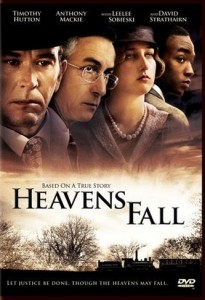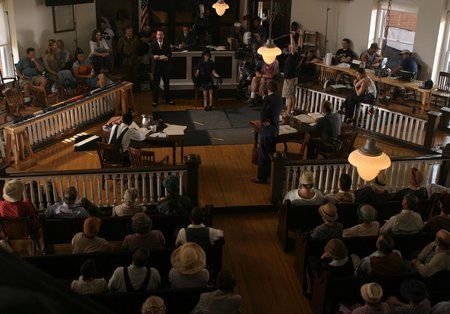Heavens Fall [DVD] (2006) Starring Timothy Hutton, David Strathairn and Leelee Sobieski
Rating: 




“Years from now, people will hear the word Scottsboro and it will mean something.”
This is the courtroom drama that depicts the same events that inspired the Robinson trial in Harper Lee’s To Kill A Mockingbird. I post the following review for these reasons. Firstly, the interesting character of Samuel Leibowitz, who had a long career as a criminal defense attorney, secondly, the depiction of prejudice and its wider implications, and thirdly, the damage done to the lives of falsely accused individuals. It is all the more harrowing for being a true story, and a relatively recent one.
the interesting character of Samuel Leibowitz, who had a long career as a criminal defense attorney, secondly, the depiction of prejudice and its wider implications, and thirdly, the damage done to the lives of falsely accused individuals. It is all the more harrowing for being a true story, and a relatively recent one.
On March 25th 1931, nine young black men were pulled off a freight train by an angry Alabama lynch mob. Eight of the nine (the ninth was only twelve) were accused of raping two women and subsequently sentenced to death in the electric chair. The United States Supreme Court eventually granted a re-trial for all the defendants. Skilled New York defence attorney Samuel Liebowitz went to Alabama to defend the Scottsboro boys at the behest of the International Labor Defense. His journey into the Deep South symbolized the deep racial divide of the times and set in motion a legal battle that ultimately changed the course of American jurisprudence. The Scottsboro case was a tragic chapter in American history and a story of epic injustice. From their arrest in 1931 to the release of the last Scottsboro defendant in 1950, the rights of nine young black men were violated. During the re-trials, one of the alleged victims, Ruby Bates, admitted going along with the rape story and asserted that none of the Scottsboro Boys ever touched either of the white women. Certain that the strength of the evidence would win the case, Leibowitz wasn’t prepared for the deep racial prejudice he found. Heavens Fall is the tragic true story of jurisprudence undone by racial prejudice. The case is now widely considered a miscarriage of justice and also led to the end of all-white juries in the South..
Writer-director Terry Green is mainly interested in the 1933 re-trial and he wastes little time getting there. The incident of the alleged rapes is actually given little screen time in Heavens Fall. As the movie opens we catch glimpses of some violence between two groups of men on a train..
Samuel Liebowitz (Timothy Hutton) is the smooth New York lawyer who has never lost a capital case. After reviewing the transcript of their initial trial he’s convinced the Scottsboro boys didn’t receive a fair trial. Sure in his conviction and confident of the facts, he makes the trip south to Decatur, Alabama, to defend the first of the boys being re-tried. Along the way, he’s a little taken aback when another passenger tells him, “They don’t need defending. What they need is a rope wrapped around their skinny necks ’til they’re dead.”
Another traveller from the North is William Lee (Anthony Mackie), a black journalist for a Chicago newspaper. He goes to Decatur to cover the re-trial but he quickly learns that he is just another outsider from the big city regardless of the colour of his skin. He needs to win the local black community’s trust before they will sign his petition to the judge asking for permission to sit in the court and report the proceedings.
The lead prosecutor is Thomas Knight Jr. (Bill Sage). Born and raised in the South, he is the son of a prominent Alabama justice. Determined to show that a Northern Jewish lawyer can’t come to Alabama and tell them how to apply the law, he’s also aware that winning this case would be a huge boost to his career.
Judge James Horton (David Strathairn) is the local justice presiding over the first re-trial. He is the judge with the weight of the world on his shoulders and justice on his mind. Under the spotlight of this racially charged and politically sensitive case, it falls upon him to maintain order and ensure justice is properly served. He instructs the jury, “Let justice be done, though the heavens may fall.” Unlike the rest of the town, he comes to believe that the defendants are innocent.. “These women are shown … to have falsely accused two Negroes … This tendency on the part of the women shows that they are predisposed to make false accusations..” and against advice, dismisses the verdict, knowing it would cost him his job when he ran for re-election.
The opening moments of the movie are conducted with the assumption that the audience has a basic knowledge of the history of the Scottsboro boys’ trials. And the attitude of the filmmaking does make a strong presumption toward the innocence of the accused men. Nevertheless, the story still captures some of the tension and suspense that surely accompanied the case depicted.
After all the characters have been introduced and the action moves to the re-trial at Decatur, the film takes on the appearance of a reporter’s view. To the director’s credit, the North-South stereotypes are avoided and each of the main characters are presented as complex and believable individuals. Timothy Hutton gives an energetic performance as the experienced New York lawyer. He’s pretty sure of himself at first, but is taken aback when he realizes his style isn’t reaching the locals sitting on the jury. Bill Sage gives a sympathetic portrayal of the prosecutor determined to win his case though he may have his own doubts regarding the strength of the evidence. The film excels in portraying the sympathy these characters have for each other, despite their obvious differences, and this in turn offers possibilities when we consider the prejudice of the community at large.
Leelee Sobieski is convincing as Victoria Price, one of the boys’ accusers, whose cold demeanour and stubborn testimony invites suspicion. As a testimony on her depiction, in reality, Leibowitz later conceded that Price was “one of the toughest witnesses I ever cross-examined”. Her answers were evasive and derisive. She often replied, “I can’t remember” or “I won’t say.” On being confronted: “You’re an actress aren’t you?” She replied to Liebowitz: “You’re a bit of an actor yourself..”
The strength of Heavens Fall is the portrayal of the three legal men arguing and considering the evidence. They make their characters well reasoned and intelligent, however, unless you count Victoria Price, the dramatic tension of the courtroom scenes is diminished somewhat because there is no true villain involved in the proceedings. Those scenes circle around an inevitable conclusion instead of creating suspense over whether or not the accusations are true. The outcome of the trial is a matter of history but the assumption that the audience knows where the story is headed robs the sense of immediacy. It doesn’t help when the script settles for standard courtroom twists like the surprise witness Ruby Bates. There is also an absence of realistic danger outside the courtroom. The mood of the community is supposed to be heated but even an angry, gun wielding mob can be diffused with a few stern words and a promise from the National Guard.
Heavens Fall is a beautifully produced film with modest but convincing period details. As a fan of Southern-style music, I felt the music was unobtrusive to the point it would have been good to hear more of it. I haven’t personally seen other versions of this important account, but this one was thought provoking.
I feel I must conclude by repeating a story about Sam Leibowitz: In a lecture on the laws of evidence, he once held up a pack of Camel cigarettes and asked his audience; “Is the man riding the camel or holding the halter and leading him?” Answers were divided but not one person answered that there is no man in the picture on the package..a pertinent lesson on witness reliability.
See Reference www.wikipedia.org/Scottsboro Boys
Other Courtroom drama posts: The Verdict – 1982 DVD & Tichborne Claimant-1998 DVD